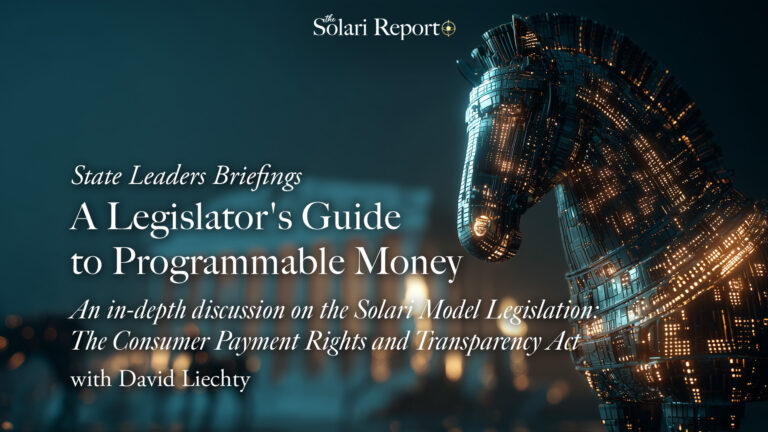A Short Preview (Login to Access the Full Interview):
Theme: Bank Run or Take Down?
Interview: Solution Series: Securing Your Privacy from Big Tech with Rob Braxman
Take Action
Please login to see stories, charts, and subscriber-only content.Not a subscriber yet? You are invited to join here!






















































































































Just now recent data shows FED balance sheet has spiked up
CBDC Pushback, Attorney Tom Renz
https://www.zerohedge.com/personal-finance/tyrants-are-passing-state-laws-push-cbdcs
Thank you both – and the team – as ever.
It was clear by March last year that the fallout from the C19 injections might destroy trust in all vaccines, and we’re seeing that play out. But the biotech mob have another Achilles heel: they need lab rats, and numbers are dwindling. There were a few articles on this in the UK last month, perhaps a canary in the coalmine, but the story has been smothered. Might be one to keep an eye on, if only as legislation is drafted to avoid a crunch, legitimising operating “at the speed of science”…
https://www.theguardian.com/science/2023/feb/27/patients-losing-out-amid-slump-in-nhs-clinical-trials-warn-top-clinicians?trk=public_post_comment-text
Haha!
I had to go to the site to see if you were referring to four legged or two legged rats.
Listen to what John said about the UCC change proposals. Change in state commercial statutes has no effect whatsoever on whether CBDC is money or not money. UCC-based state commercial statutes deal with transfer of, security interests in and other matters dealing with transactions in assets. The ABA committee that adopted changes to the uniform code (which states can adopt or not) says CBDC was recognized in a previous version — not the 2022 changes. I, frankly, have not mastered UCC in the last 30 years since I was in law school, if I ever fully mastered it, so I cannot say from the proposed changes in state law (which involve adoption of the uniform code changes from 2022) what exactly is the practical, on-the-ground effect would be to the ordinary person or, for that matter, on businesses, including banks, that deal in intangible assets. The effect MIGHT be just making clear how to transfer crypto, CBDC and other intangible assets not previously addressed. If that is the case, it is a good thing to provide certainty in business transactions. All of the summaries I have found so far do not address what the bottom-line practical effects would be, particularly on other parts of state laws (i.e., non-UCC/commercial statute matters). If anyone has found such an explanation, please let me know!
Good points. My understanding is that the Uniform Law Commission, in Chicago, wrote this in July, 2022. The amendment contains significant changes to definitions, plus, new provisions about “controllable electronic records,” and a new chapter 12. These changes and additions are being made to Article 4, Bank Deposits and Collections. I believe legal scholars and others working with commercial transactions should have more time to study and comment on these changes to the UCC before state legislators are asked to pass legislation. Most of them have no idea what they’re voting for.
https://www.natlawreview.com/article/new-ucc-article-12-matters-to-more-just-cryptocurrency
Electronic Chattel Paper?
https://www.wordnik.com/words/chattel
The UCC changes seem to be concerned with liens and perfection of collateral, and may be more about digital blockchains being used to control physical (including human?) assets than “currency”.
https://www.wolterskluwer.com/en/expert-insights/perfecting-a-security-interest-in-digital-assets
https://www.mayerbrown.com/en/perspectives-events/publications/2021/08/virtual-currencies-and-other-digital-assets-under-the-ucc
https://bracewell.com/insights/new-ucc-article-12-foreseeable-issues-using-cryptocurrencies-and-nfts-collateral
A bit like SVB and other banks giving loans and requiring the funds to be deposited at the bank which issued the loan?
Congrats to Dutch farmers! Anyone know the final count of seats? https://news.yahoo.com/populist-farmer-citizen-movement-wins-115831931.html
Not what it seems. Not good news The one party pushing for fundamental change, lost 10 of their 12 seats.
Agree with you 100% Catherine as it is another example of “twining”. Using BBB may stand for Build Back Better.
🙁 That explains why MSM is “celebrating” these results.
Patrick Wood: https://patrickwood.substack.com/p/breaking-trilateral-commission-calls?utm_source=substack&utm_medium=email#play
Already posted!
John Titus: which browser extension are you using for highlighting, which does not work with Substack? In theory, Firefox’s “Reader View” should be plain text and compatible with manual text selection.
For Money and Markets, I use Brave, and the extension is Weava.
In Firefox’s “Reader View,” can I highlight multiple passages on a single page and come back to them later–after I’ve clicked off the page and into, say, another application? I could never get that to work.